Alpino brings a foreign, yet familiar cuisine to Detroit
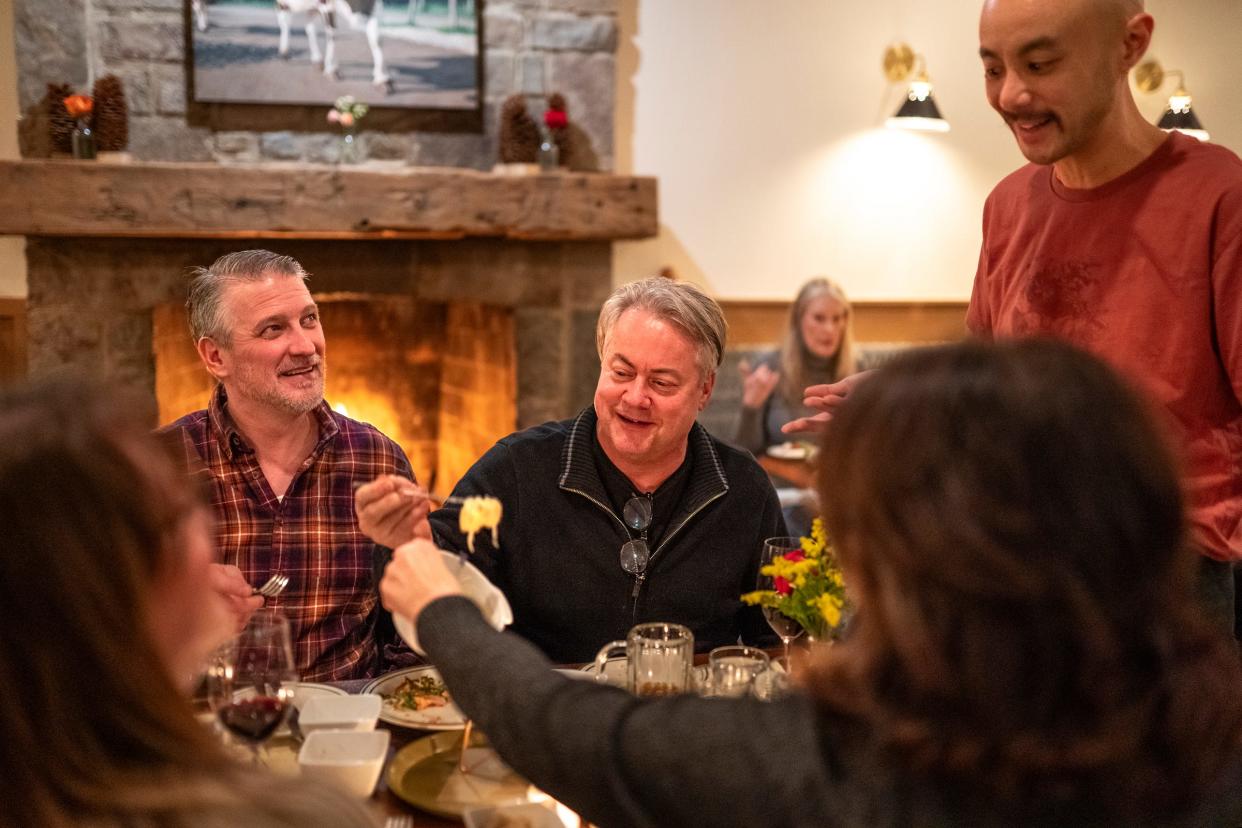
Shining a light on Alpine cuisine, seasonal ingredients and quality wines, Alpino earns the title of 2024 Detroit Free Press/Metro Detroit Chevy Dealers Restaurant of the Year.
Last December, I took a detour from a vacation in Milan, Italy, to get a glimpse of Zurich, Switzerland. I'd hoped to feel the pulse of a city in the Alpine region, the territory from which Corktown restaurant and 2024 Restaurant of the Year Alpino draws its inspiration, even if only for a few hours.
A lot of the experience felt foreign: the Swiss German language, the colorful Swiss franc bills — navigating stop-and-go traffic of busy, icy city streets in a stick shift. But there was a familiarity in the food of Zurich.
Mild sausages and sweet sauerkraut called to mind dishes I've scarfed at Jacoby's in downtown Detroit, and the ever-present rosti, dressed down from its fanciful presentation at Alpino, was nothing more than a salty, dense potato pancake. Rich chocolate cakes were served with a side of fresh, tart gooseberries and currants — the same berries I've foraged in Michigan woodlands — and as a street vendor handed over a basin of hot, fried apples topped with crunchy sugar crystals, the transaction sparked the memory of my wedding night when my husband and I downed carnival treats at a Michigan fair.
My impression of Alpine cuisine from my very brief day trip to Zurich contextualized the essence of Alpino, a restaurant centered on a cuisine from a far-flung region that, in a number of ways, hits close to home.
Alpino is inspired by the Alpine region, the majestic stretch of land impaled by peaks of the grand Alps that span across eight European countries. The unifying element of the Alpine States (Austria, France, Germany, Italy, Liechtenstein, Monaco, Slovenia and Switzerland; each country with its own history, cultural traditions and language), is the mountain range that runs through them — and the cuisine centered on the bounty of the Alps they share.
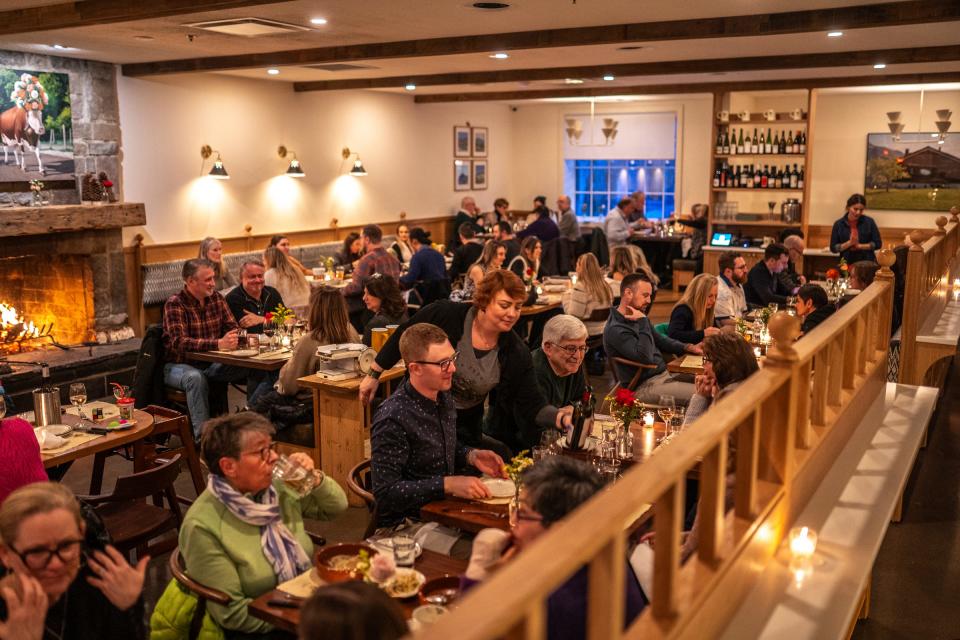

Across the region, dishes are laden with yields of nearby mountains, valleys and streams. Plump dumplings are filled with sweet spinach, meaty char filets are fresh-smoked and buttery pastries are bejeweled with tart wild berries. Briny, fatty ribbons of speck and other cured meats are Alpine cuisine’s pearls of wisdom from generations mastering the art of aging and preservation, ancient survival techniques for storing meat over frigid winters.
From modest places and humble hands come the region’s showpieces: dairy products. Milk, cream and cheeses of varying textures and flavors are a diner’s window to the beauty of pastoral landscapes — the cattle, goats and sheep that browse and graze there; the dairy farmers who shepherd them and the artisans who craft the specialty foods we eat from their supply.
Whereas American custom treats cheese as an accessory, a slip for smash burgers, a headpiece for a bowl of pasta; Alpine tradition recognizes the dairy form as a staple. Here, you’ll ceremoniously swirl tears of bread into dense fondues of nutty Gruyère cut with herbs and acidic notes of white wine. You’ll cloak a small side of boiled potatoes in warm, gooey raclette so rich you’ll hardly need a main course.
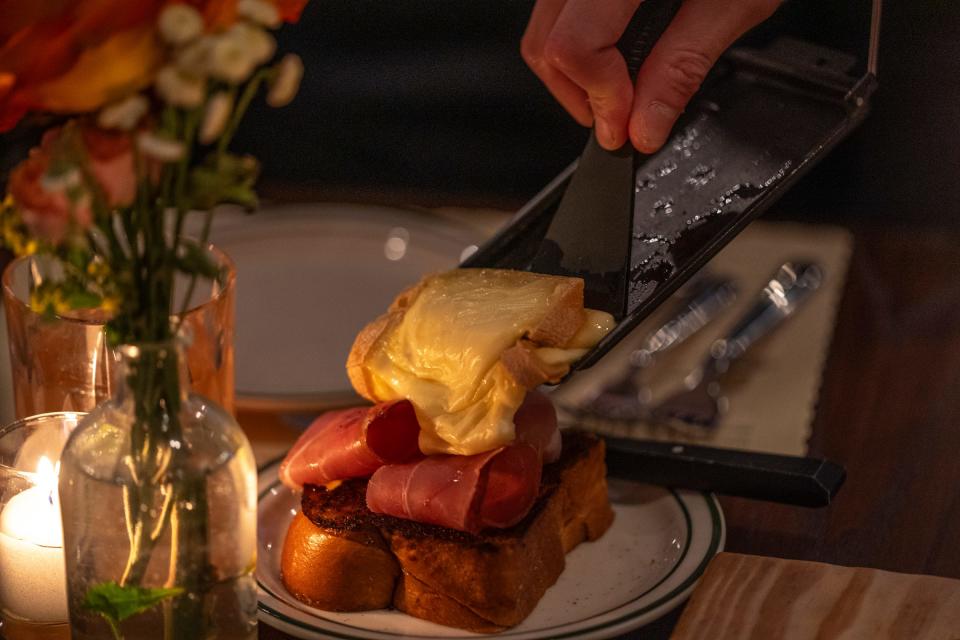
Alpino’s ability to honor Alpine traditions so well is due in large part to its hometown. Michigan, one of the eight American states that make up the Great Lakes region, though notoriously flat, bears similar geographical attributes that typify Alpine cuisine. Fresh waters serve as natural habitats for mild-flavored fish, and lush woodlands are ideal environments for edible plants, fungi, nuts and wild berries. Cold winters have even groomed great food preservationists, giving life to sweet jams and pungent pickles.
This agricultural parallel allows Executive Chef J. Colin Campbell to cull ingredients from Michigan purveyors and farms in the surrounding Great Lakes region at Alpino. It allows him to ladle a silky cream sauce teeming with plump morels sourced from Michigan over crisp Wienerschnitzel and allows diners to slather slices of housemade bread with knifebacks of smoked butter churned Up North, where grass-fed cattle graze Michigan’s verdant pastures.
"We source from a daunting number of resources to supply such a regionally specific menu. Too many to keep organized without a hefty stack of spreadsheets," Campbell said. "However, continuing to develop relationships with Detroit based farms and producers is a constant goal of ours. Supporting local has been important to chefs for well beyond the length of my career, and the importance of it has never been lost on me. Using quality ingredients is the premier responsibility when it comes to producing great food. My obligation to seek them out is one I take happily."
In more recent years, metro Detroit’s restaurant industry has become saturated with New American restaurants, often vague fusions that don’t allow any particular cuisine or culture to shine. New American concepts tend to adopt the parts of international cuisines that align with the American palate and modify those that do not. I’d argue that there’s little new in New American cooking, as American cuisine has always been influenced by global foodways and later adapted, modernized and made anew.
Then there are the establishments that paint broad strokes with the cuisines they serve, representing entire countries with little acknowledgment that each region brings its own flavor profiles and traditions.
Alpino, however, is specific.
Its regional focus raises the consciousness of metro Detroit diners already well acquainted with the cultural flavors brought to southeast Michigan by German and Italian immigrants and builds upon Detroit’s French legacy from its decades under the rule of France.
"We want to be inspired by the regions, whether it's the ingredients that we're using, and/or the dish is composed in a way that speaks to the area, but we do it in our own style," Richter said.
The more difficult-to-pronounce yet easy-to-enjoy elements on the menu wink at the Alpine region’s Austrian and German inflections — an herbaceous plate of gurkensalat, Persian cucumbers slicked in crème fraiche and ornamented with frills of fresh dill and marigold petals; a cheesy, pizza-like flatbread topped with smoky hunks of lardon called flammekueche.
You’d expect the only sausage-forward entrée to draw from German roots, yet Alpino’s diots au vin blanc is a rendition of an ethereal dish native to Savoie, France. Two thick pork sausage links glisten in a broth of white wine and soft red onions with fragrant sprigs of fresh thyme.
Buckwheat muesli brings a gust of the Swiss Alps along with Alpino’s crown jewel, the rösti. A crunchy casing surrounds a 2-inch-thick potato pancake. When cut into, stems of spicy mustard greens, slippery mustard seeds and flaky pieces of smoked salmon fall onto the soft, salty potato innards. Though intended to be a mere starter on Alpino’s menu, it is, by and large, the best bite I had in 2023.
And a nutty, textural pesto risotto made with Carnaroli rice from Italy’s Piedmont region is an ode to the Italian Alps.
There is thoughtful cohesion at Alpino, from the way the butter-colored walls match the thin paper menus that dual as placemats, to the way the overall space embodies the look and feel of an elegant mountain hut, a welcome home for mountainous fare.
Credit for the immaculate detail that has gone into Alpino is given to owner and operator David Richter. The metro Detroit native cut his teeth in hospitality in New York City, garnering much of his experience in Italian restaurants and wine operations and eventually climbing the ranks at City Winery, the restaurant, winery and music venue with locations across the country. Upon his return to Detroit, Richter sought to stay within his wheelhouse and open an Italian restaurant with a strong Italian wine program, focusing on foods of the northern Italy region. The growth of the city’s dining scene, however, came as a surprise and soon, Richter recognized the landscape needed not another Italian establishment. And so, Alpino was born, where Italian inferences could find life in an unexpected form.
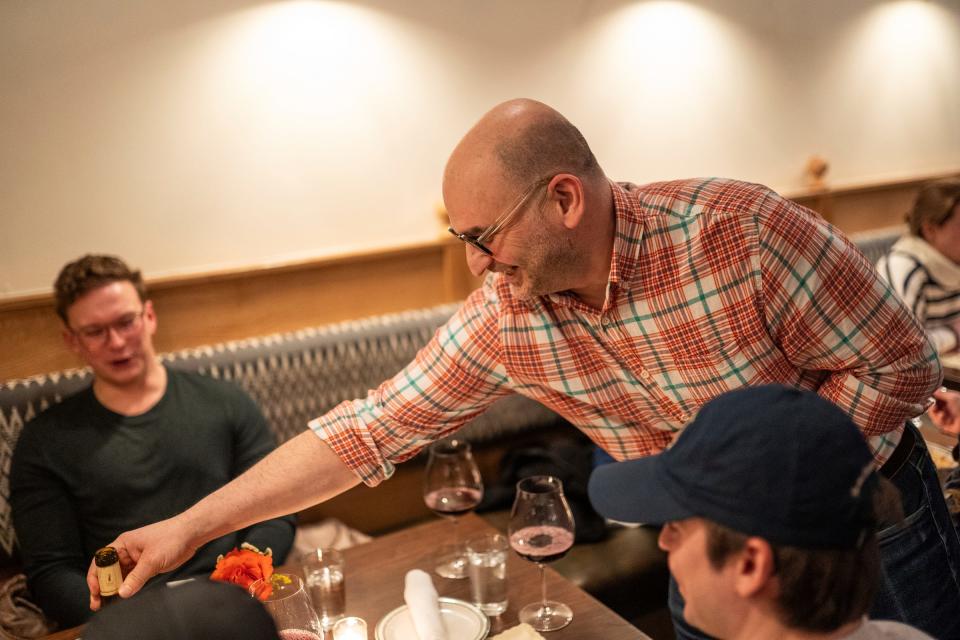
"The idea was always to keep it to northern Italian food and wine," Richter said. "And as I did more research to find out if there was a synergy between all the different regions, I realized that people haven't really focused on this as a genre, so how do I compose it in a way where it feels like a celebration of that whole backbone of Europe and gives you some kind of an identity? I almost feel like we ended up having a Swiss-Austrian-German restaurant by a happy accident, but of course with Italian influence."
After acquiring the Corktown space, it would be more than two years before Richter would open the restaurant’s doors. In the meantime, the owner partnered with Parini on interior design and tapped Campbell to head up the kitchen.
A native of Charlevoix, Michigan who, in recent years, led the culinary programs at restaurants in the Upper Peninsula, Campbell brings to Alpino the very flare of northern Michigan that aligns with Alpine cuisine. His deftness with bouncy handmade spätzle and his ability to pound pieces of veal into silky sheets that'll ultimately be fried into perfectly crisp schnitzels, hearkens back to his days as executive chef at Steinhaus in Marquette, Michigan.
"My experience in Alpine cooking comes primarily from Steinhaus, where we did a lot of German, Austrian and some French food, so when I saw Alpino and this Alpine-influenced restaurant, I though, 'I've definitely some experience running kitchens that cook a good portion of this food,'" Campbell said. "Having been a chef for 10 years, it's nice to join something with such a unique concept, something that I really feel drawn to. It really feels like the restaurant, has true heart and soul with its mission statement and there are similarities between its philosophies and what I have learned."
Desserts and beverages follow Campbell’s lead in the kitchen like a trail of marching ants. Bar Manager and Lead Bartender Andre Sykes has curated a menu of refreshing cocktails that pour down your tongue like a cool mountain stream. Sykes balances Alpine and Midwest-distilled spirits with bright syrups infused with elderflower, juniper and pine that are simmered in house. Richter parades his wine knowledge with an extensive menu of bottles traced from eastern France and northern Italy to Austria and Slovenia. Aromatized wines animate juices from Piedmont, Italy with herbs and spices.
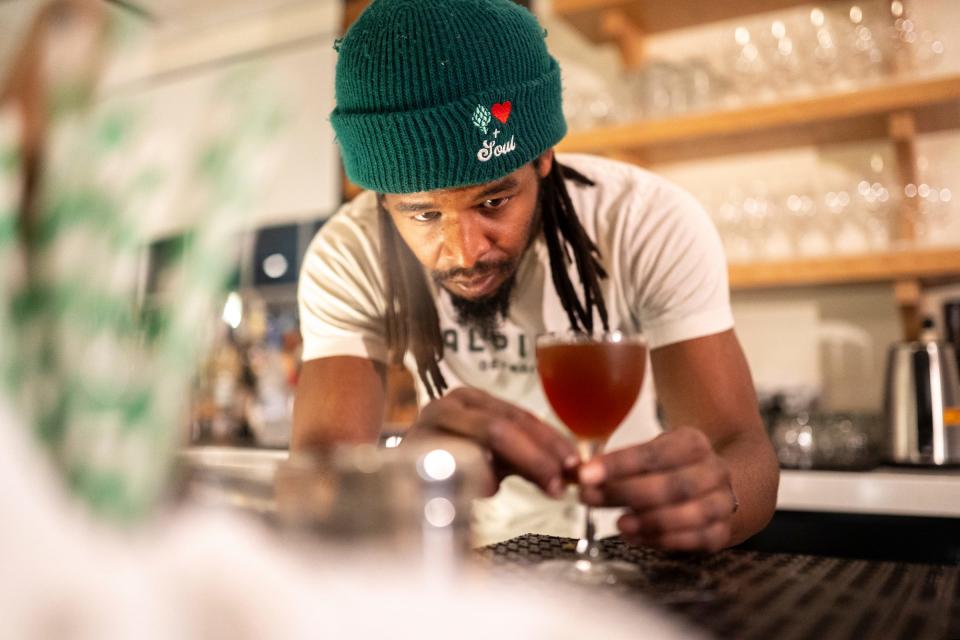
The Piedmontese bonet concludes the meal with a rich mound of Michigan-made chocolate the shape of a foothill with pieces of the Italian almond cake called sbrisolona the shape of rocks at the base. The sbrisolona here is made with buttery hazelnuts and the chocolate is glossed in caramel.
For the Rosette, a crisp pastry shell the shape of a laser-cut flower is decorated with velvety apple butter, syrup-drenched diced apples and a scoop of vanilla ice cream from Guernsey Farms Dairy. Powdered sugar is sifted over the dish. It’s as if the plate sat outside during a dusting of snow.
Alpino diversifies the Detroit dining scene with a cuisine that, at first glance, appears foreign, but when examined more closely, feels familiar. It places ethnic groups with deep roots in the Detroit area at the heart and draws parallels between foods and cooking techniques cultivated in Alpine landscapes and the Great Lakes.
With its Michigan-made ingredients and Alpine traditions, Alpino exists as a reminder that we can draw parallels to cultures that feel so far away simply through the foods that bind us.
Alpino
1426 Bagley St., Detroit. 313-524-0888; alpinodetroit.com
Ticket sales for the upcoming Detroit Free Press/Metro Detroit Chevy Dealers Top 10 Takeover dinner series benefit Forgotten Harvest, an Oak Park-based nonprofit committed to fighting food insecurity in the Detroit area. Dates for the 2024 dinner series will be announced later this month. Visit freep.com/top10 for updates on the events. For a chance to win $500 to dine at five restaurants on the 2024 Detroit Free Press/Metro Detroit Chevy Dealers Restaurant of the Year and Top 10 New Restaurants & Dining Experiences list, visit freep.com/roycontest24. Contest ends March 11 at 11:59 p.m.
This article originally appeared on Detroit Free Press: Alpino is the Detroit Free Press 2024 Restaurant of the Year

